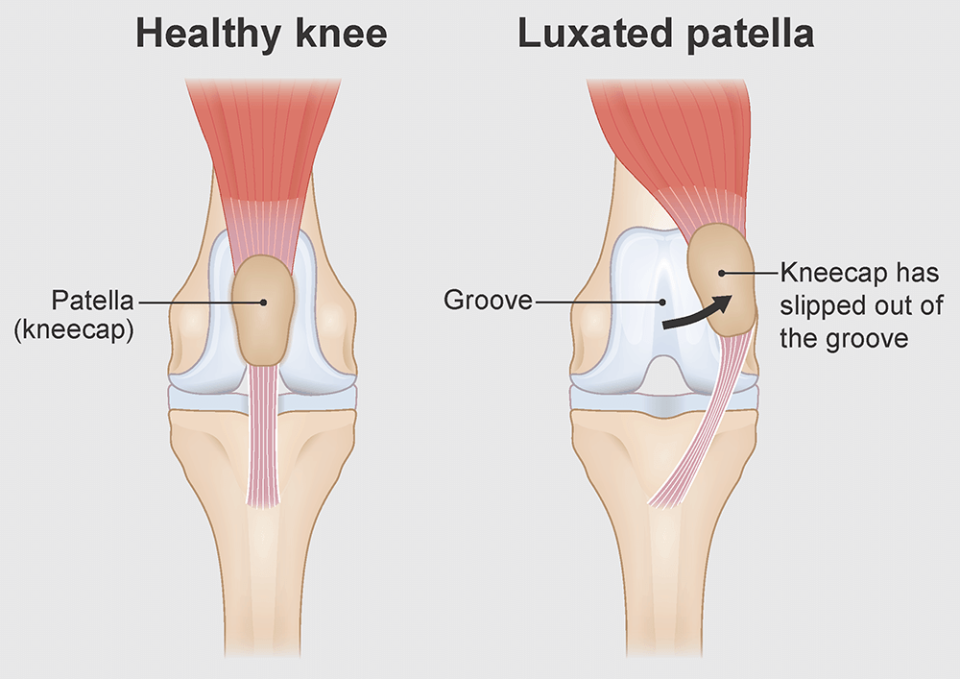
Luxating Patella Surgery for Dogs
Have you noticed your dog occasionally skipping a step, hobbling, or letting out a sudden yelp while walking? These could be signs of a luxating patella. At Brunswick Veterinary Hospital, we’re here to help you understand this condition and the surgical options available to restore your dog’s mobility and comfort.
We are proud to offer luxating patella surgery as part of our comprehensive orthopedic care services. Our skilled veterinary team is experienced in diagnosing and treating this condition using advanced surgical techniques designed to relieve pain and restore mobility.
Our state-of-the-art facility is equipped with modern surgical tools and monitoring equipment, ensuring the highest level of care and safety for your pet during the procedure. From initial diagnosis to post-operative rehabilitation, we provide compassionate, personalized care to help your dog achieve the best possible outcome.
What Is a Luxating Patella?
The patella, or kneecap, is a small bone that normally sits in the trochlear groove of the knee, connected by a ligament that aids in leg movement. When functioning properly, it allows smooth motion and stability for your dog’s hind leg.
A luxating patella occurs when the kneecap dislocates from the groove, causing discomfort and instability. This condition is often referred to as a dislocating kneecap.
Surgery is frequently recommended for dogs with patellar luxation to alleviate pain, reduce wear on the joint, and prevent the progression of arthritis.
Grades of Patellar Luxation
Patellar luxation is classified into four grades based on its severity:
Grade 1: The patella occasionally dislocates but returns on its own within a few steps.
Grade 2: The patella stays out longer and may need limb movements, like shaking or extending, to return to position.
Grade 3: The kneecap is frequently dislocated, causing persistent lameness and increasing the risk of ligament damage.
Grade 4: The patella is permanently dislocated, leading to significant pain, restricted movement, and rapid joint degeneration.
Signs Your Dog May Have a Luxating Patella
Symptoms vary depending on the severity but may include:
- Intermittent skipping or bunny hopping
- Sudden yelps of pain while walking or running
- Hind leg weakness or resistance to exercise
- Bowed or knock-kneed appearance
- Difficulty jumping, running, or rising from the floor
What Causes a Luxating Patella?
This condition is often inherited but may also result from trauma or other knee injuries, such as cruciate ligament tears. Small and toy breeds, including Chihuahuas, Maltese, and Bichon Frise, are more commonly affected. In about half of cases, both knees are impacted, though one side may be worse.
When Is Surgery Needed?
While dogs with Grade 1 luxation may tolerate the condition for years, untreated cases often lead to arthritis and further knee damage. For Grades 2 and above, surgery is generally necessary to restore function, reduce pain, and prevent worsening of the condition.
Surgical Treatment for Luxating Patella
Surgical techniques vary, but the procedure often includes:
- Realigning the patellar ligament to its correct position.
- Deepening the trochlear groove to secure the patella.
- Tightening the joint capsule to prevent future luxations.
- In some cases, placing an implant to stabilize the patella.
Post-Surgery Recovery
After surgery, your dog will require careful at-home care to ensure a smooth recovery. Most dogs begin weight-bearing within the first week and regain mobility over 12 weeks. Physical rehabilitation is often recommended to support healing and restore strength.
Prognosis After Surgery
Most dogs recover well and enjoy an excellent quality of life after surgery. Early intervention offers the best outcomes, with many dogs regaining full strength and range of motion. For dogs in advanced stages or with arthritis, ongoing management and rehabilitation can still provide significant relief and improved mobility.
If your dog is showing signs of a luxating patella, Brunswick Veterinary Hospital is here to provide expert care. Contact us today at 518-279-0700 to learn more about how we can help your pup live pain-free and be active again.

